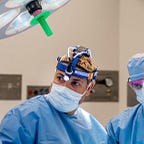When a Cancer Surgeon Becomes a Cancer Patient
‘I now know that I actually knew very little’
“Why me?”
It’s a question I often hear among my patients when I share a new diagnosis of cancer. People want to know why. Is it their fault? Did a family history catch up with them? Did they smoke or drink too much, should they have exercised more, was there a genetic component? Cancer is a common disease, and yet it never makes sense when it’s happening to you.
On Sept. 13 — just nine months ago — I awoke after a colonoscopy to my wife leaning over my stretcher railing, sobbing. My wife, a radiologist at Harvard, is the rock of our family. I’d never seen her cry like that in our over 20 years of marriage. She broke the news to me: They discovered colorectal cancer during my colonoscopy.
I am only 48. I am healthy and have no risk factors. “Why me?”
I’m a breast cancer surgeon working in Boston at the renowned Brigham and Women’s Hospital and Dana-Farber Cancer Institute. I’ve dedicated my entire professional career — and plenty of my life outside of work — to treating women, and quite a few men, with breast cancer. I like to think of myself as an empathetic physician, and my track record confirms I’m a talented surgeon. I’m focused on identifying the best ways to treat people with early-stage breast cancer, and I’ve become an advocate for taking a less invasive approach to avoid overtreatment. Over the last 16 years of practicing, I estimate I’ve cared for several thousand people, and I always learn something about the cancer journey from each one. Yet since receiving my own diagnosis and starting treatment, I’ve realized I actually knew very little.
On the day of my colonoscopy, the nurse asked me questions about my medical record:
Have I had surgery before? “No.”
Do I take any medication? “No.”
Have I ever been hospitalized? “No.”
On and on, all my answers were no, and in some cases, I wanted to say, “Of course not, I practice what I teach.” Yet, there I was for a colonoscopy two years earlier than someone my age is supposed to. I should’ve known something was wrong.
